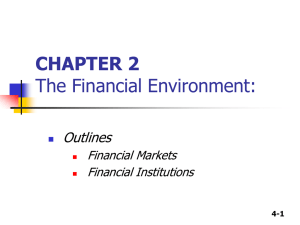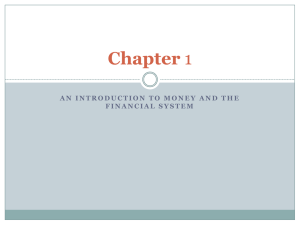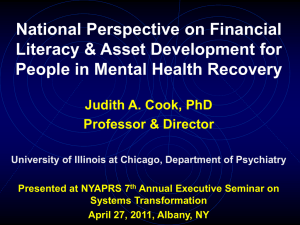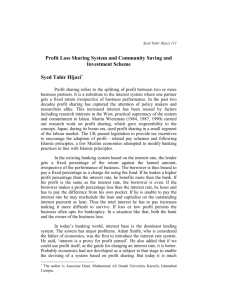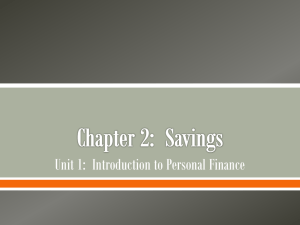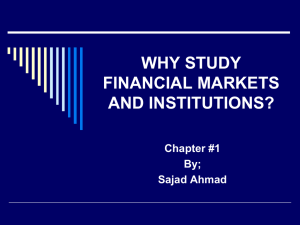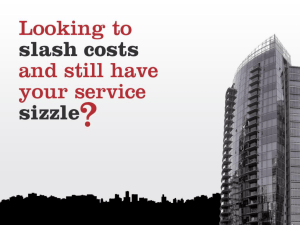De Woonzorgteams hebben een opdracht als Energiesnoeiers
advertisement
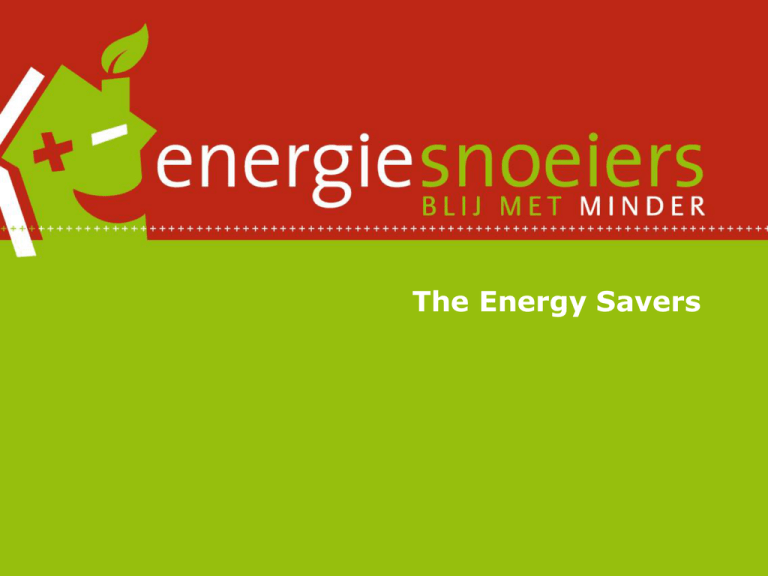
The Energy Savers Short presentation of Who is KOMOSIE? Who are the Energy Savers? ▪ ▪ ▪ ▪ Background and context Activities Added values Lessons learned Outlook for further development Source: BND Kortrijk vzw FLANDERS? KOMOSIE Who we are KOMOSIE = KOepel van MilieuOndernemers in de SocIale Economie = ‘Federation of environmental enterprises in the social economy’ ▪ Social Economy? = not-for-profit organisations employing low skilled long term unemployed people Established in ‘94 in order to group, represent and support social economy enterprises that are related to environmental protection Federation of: ▪ all reuse centres (31) in Flanders ▪ (nearly) all “Energy Savers”-companies (34) Staff: 15 persons – 13,5 FTE Short presentation of Who is KOMOSIE? Who are the Energy Savers? ▪ ▪ ▪ ▪ Background and context Activities Added values Lessons learned Outlook for further development Source: BND Kortrijk vzw The Energy Savers : How did it start? Academic study (HIVA, 2006) “There is potential in developing social economy activities in the energy market” High potential for energy saving in Flanders Drive for innovation within KOMOSIE Lot of green jobs! also for lower skilled or unemployed people? “Let’s create in the social economy a new sector energy saving” The Energy Savers : How did it start? The minister of Social Economy launched the name “Energy Savers” (end 2006) KOMOSIE was given the task to create this new sector in the social economy The Energy Cutters “Energy Savers” are lower educated & long-term unemployed people, trained to implement ‘energy saving interventions’. ▪ Lower educated and long-term unemployed: ▫ Working within a social economy organization ‘The Energy Saving Enterprise’ ▪ Trained and supported: ▫ Within the own organisation ▫ Training by KOMOSIE or external partners ((Quality!) ▪ Additional social goal: give priority to lower income households Facts and figures 34 social economy enterprises cooperation with 260 municipalities (= 85%) ± 240 jobs (145 FTE “Energy Cutters”) A picture of our sector today Activities of the Energy Savers 1. Energy checks in homes ▪ since 2007 ▪ 70% of municipalities choose to cooperate with “Energy Cutters” (from 50% in 2008) ▪ 21 400 in 2010 Source: BND Kortrijk vzw 2. Small energy-saving activities ▪ since 2008 ▪ ~25 small ‘e-saving’ interventions Can be independent activity, but often local lack of financing Source: KOMOSIE vzw Activities of the Energy Savers 3. Roof insulation ▪ since 2008 ▪ 6-day training course ▪ in cooperation with the building sector ▪ > 1 200 roofs insulated in 2010 ▪ about 70 Energy Cutters lots of subsidies, but “split incentives” and lack of prefinancing for the low-income people, Source: KOMOSIE vzw Source: KOMOSIE vzw 1. The energy check An energy check = free screening of the ‘energy situation’ of a house, during which the resident receives energy saving tips (= sensibilisation) and during which 4 energy saving materials are installed ▪ Spare bulb, water saving shower head, pipe insulation and/or insulation foil behind radiators Sensibilisation and energy saving go hand in hand 1. The energy check: background & context Public service obligations of the Distribution System Operators (DSO) ▪ Obligation to carry out 25.000 free energy checks per year (~1%) ▪ Financing: ▫ DSO gets 200 € from Flemish government executor receives max. 180 € ▫ DSO supports the executor with software, training, material ▪ Important role for the municipalities ▫ Choice of executor: own employees, DSO or a 3rd party e.g. ‘social economy’ (75%) ▫ Collecting addresses from target groups for this energy check This enabled the concrete start of the Energy Savers 1. The follow-up check – 2 types After the energy check for homes without dubble glazing or roofinsulation, since 2010 Goal = lower thresholds towards having these works executed Type 1: evaluation of the first (basic) energy check, comparison of commercial energy suppliers, inform about al sorts of energy subsidies and 5 additional energy saving interventions: ▪ switchable plugboards, aerate radiators, strips for window and doors, timers on electrical waterboiler, thermostatic radiatortaps Type 2: support in the whole process of information and placing of roof insulation of glazing ▪ estimate (netto-)costs, measure and make a proposition for potential building companies, evaluate offers, help with application for subsidies Added values Our unique selling proposition: 1. approach tuned to the most vulnerable target group 2. lowering the threshold - we go into the homes - Energy Savers are ‘experts’ themselves (often from vulnerable families), their empathy is real - Energy Savers have more attention for the human aspects and take their time for each visit 3. quality in what we do Added values 2009 Social employment, energy saving, increasing of the housing quality and poverty reduction Energy savers are an ideal instrument for a sustainable (local) policy The added value of a federation to support the network of Energy Savers Research of new activities (innovation) Policy follow-up and representation Partnerships, external contacts (networking) Member support: ▪ ▪ ▪ ▪ ▪ Training and expertise-building Professionalization: business plan, legal advice, registration … Quality management Sector-building: stimulating exchange of experiences and cooperation Communication: website, tools... Lessons learned Our strenghts mulitple added values of the Energy Savers ambition to develop the posibilities on a countrywide level supported by an umbrella-organisation (KOMOSIE) supported by (Flemish) government and policy creating cooperation and bridges with othr actors social entrepreneurship of the 34 individual SE-companies and their local and regional network Lessons learned Our weaknesses dependance on government funding ▪ customer readiness for payment for the energy check is low ▪ highly dependent on the (new) policy priorities re-employment of our employees in a traditional company ▪ The job of “energy checker” barely exists in regular economy? ▪ But: the Energy Saver acquires useful social and technical skills reaching socially vulnerable people is a job on it own! ▪ Trend towards making the scan available for everyone ▫ added values of social economy are less ▪ Tip: think ahead about simple and effective ways to reach and convince your target group Short presentation of Who is KOMOSIE? Who are the Energy Savers? Outlook for further development ▪ Our ambition ▪ total scan towards housing quality ▪ other larger energy-efficient works ▪ European exchange via EC-LINC Source: BND Kortrijk vzw Our ambition Every Flemish municipality and citizen should have the possibility to appeal to a network of social economy enterprises for the execution of a wide range of energy saving measures! Innovation from energy check towards the “total scan”? Energy check is useful, but more is possible ▪ extra attention to safety, watersaving, housing quality and energy poverty ▪ ~= integration of logical policy domains as energy, housing, individual well-being Few socially vulnerable people also effectivtely do the step towards energy measures or investments that improve their living/home ▪ develop a flexible service that take more into account the specific needs/situation of every person Innovation from energy check towards the “total scan”? KOMOSIE started the “Total scan project” ▪ ~= feasiabilty study ▪ Federal funding, 1 year (end june 2011) ▪ Research and development (training, quationaire …) ▪ Pilotproject (100 visits) ▪ Evaluation and policy recommandations Breakthrough june 2011: ▪ Flemish government decides “symbolically” to uncouple the energy check from the Public service obligations of the DSO towards an integrated energy and housing policy in future Innovation from energy check to larger energy-efficiency works Energy scan is useful, but more is possible within social economy Execution of larger energy efficiency works ▪ Insulation of roofs ▫ started in 2008 within the Energy Savers project ▪ Insulation of walls and floors (cellars) ? ▪ more intense cooperation with the regular building companies ▫ cooperation on the field (subcontracting …) ▫ re-employment of our employees in a traditional building company Recruitment Social and Immersion professional requalification Preparation on leaving innovation project started since november 2010 ▫ Project partners: the major buiding sector federations Innovation European exchange via EC-Linc project Goals: ▪ Development and implementation of methodology for replicable energy checks tailored for low-income households ▫ via execution and evaluation of 1600 Energy Surveys ▪ (Re-)integration of long-term unemployed or low-skilled people in the regular job market ▪ Promotion of rational use of energy and energy efficiency 7 projectpartners from 5 countries: ▪ BEA (Berlin, projectcoördinator), DiCV Berlin (Caritas) ▪ KOMOSIE, Changeworks (UK), Energia Klub (Hongarije), RUSZ and E7 (Austria) 30 months, till november 2013 Questions? More info: www.energiesnoeiers.net info@energiesnoeiers.net KOMOSIE vzw Uitbreidingsstraat 407 B-2600 Berchem 0032 3 281 03 30 www.komosie.be info@komosie.be
